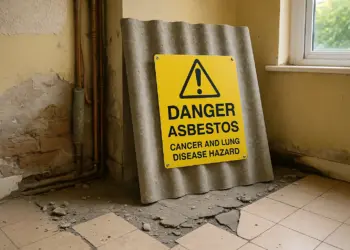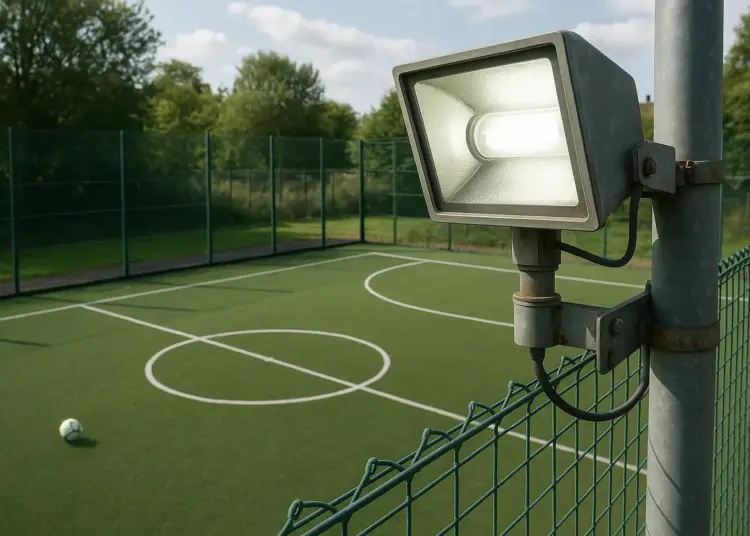Story Highlight
– Leisure centre charged over footballer’s 2016 electrocution death.
– Albert Xhediku touched a floodlight during a match.
– Friends attempted rescue but he never regained consciousness.
– Coroner confirmed fatal shock from floodlight’s lamppost.
– Court hearing scheduled for December 4, 2025.
Full Story
A leisure centre has been charged in connection with the tragic death of a local footballer who suffered an electrocution incident during a five-a-side game in January 2016. Albert Xhediku, aged 34, was playing with friends at the Mountbatten Centre in Portsmouth, Hampshire, when the accident occurred.
The incident took place while Mr Xhediku was attempting to retrieve a football that had gone over a fence. Unfortunately, in the process, he unintentionally touched a floodlight, which resulted in a lethal surge of electricity. Witnesses reported that the impact caused him to have a seizure on the spot.
Following the events of that fateful day, Parkwood Community Leisure Ltd, the operator of the leisure centre at the time, has been charged with a violation of health and safety regulations, particularly due to allegations of failing to ensure public safety. This charge has been brought forward by the Health and Safety Executive (HSE), which monitors workplace safety standards in the UK. The company is due to appear at Portsmouth Magistrates’ Court on December 4, 2025.
Xhediku, who was employed as a taxi driver, succumbed to his injuries on January 17, 2016. Despite the immediate resuscitation efforts made by his friends, who courageously tried to save him, he never regained consciousness. He was officially pronounced dead later that evening at the Queen Alexandra Hospital in Portsmouth.
Describing their loved one, Mr Xhediku’s family shared emotional sentiments, stating, “Albert was a guy who did everything with all his heart. Even when he was just playing football with his friends, he played like it was the championships. He was our big brother and a loving son.” These heartfelt words capture the essence of the man remembered not only for his joy in sports but also for his dedication to family and friends.
During an inquest held into Mr Xhediku’s death, coroner Lincoln Brookes detailed the circumstances surrounding the tragic incident. He recounted that Xhediku had screamed and suffered a seizure after the electric shock. Disturbingly, several of his friends also experienced electric shocks while attempting to rescue him from the predicament involving the floodlight. The coroner noted that Mr Xhediku had been electrocuted during a social game of five-a-side football, highlighting the casual setting of a tragedy that turned deadly in an instant.
On the day of the incident, the coroner explained that it was Mr Xhediku’s turn to retrieve the ball after it had gone out of bounds. However, upon his return, he came into contact with the floodlight, leading to the fatal electrical shock that would result in his untimely death.
In response to the incident, Parkwood Community Leisure Ltd expressed its condolences, stating, “The incident in 2016 resulted in the tragic loss of Albert Xhediku’s life. Our deepest thoughts remain with his family, friends and all those affected by the events of that day.” However, the company refrained from making any additional comments due to the ongoing legal proceedings.
The HSE spokesperson formally indicated that Parkwood Community Leisure Ltd has been charged with failing to adhere to the Health and Safety at Work etc. Act 1974. The specific allegation revolves around the company’s responsibility to ensure the safety of individuals using their facilities, which was allegedly not met in this case. The court hearing is set to be presided over by a District Judge, with preliminary discussions regarding the case happening later this year, although it may be adjourned to late January of the following year.
This tragic incident not only highlights the importance of stringent safety measures in recreational facilities but also serves as a sobering reminder of the potential dangers that can lurk even in seemingly mundane settings. The interplay of sports and safety must be a priority for facility operators to prevent further heartbreaking occurrences.
As the upcoming court date approaches, the local community and the family of Mr Xhediku continue to grapple with the loss of a loved one whose life was cherished by many. The ramifications of this case may reverberate throughout safety regulations in similar environments, urging a closer examination of how leisure facilities operate and maintain equipment, particularly regarding electrical safety.
As the legal proceedings unfold, there will be a keen interest from both the community and beyond in how this case will address issues of accountability concerning public safety in recreational spaces, ensuring that the memory of Albert Xhediku inspires change.
Our Thoughts
To avoid the tragic electrocution of Albert Xhediku, several safety measures should have been implemented at the Mountbatten Centre. Firstly, regular electrical inspections and maintenance of floodlighting fixtures should be mandated to ensure they meet safety standards and are free from faults. The Health and Safety at Work etc. Act 1974, specifically section 3(1), imposes a duty on employers to ensure the safety of the public. It appears this duty may have been breached, contributing to the incident.
Additionally, clear signage indicating hazards around the floodlights and restricting access to potentially dangerous areas during play could have helped prevent the tragedy. Implementing training for staff on emergency responses and the risks associated with electrical equipment would also be beneficial.
Key lessons include the importance of adhering to rigorous safety protocols, proactive maintenance of electrical systems, and ensuring proper public safety measures in recreational environments. Future incidents could be mitigated through strict compliance with the Electricity at Work Regulations 1989, requiring all equipment to be installed and maintained safely to minimize electrical hazards.






















